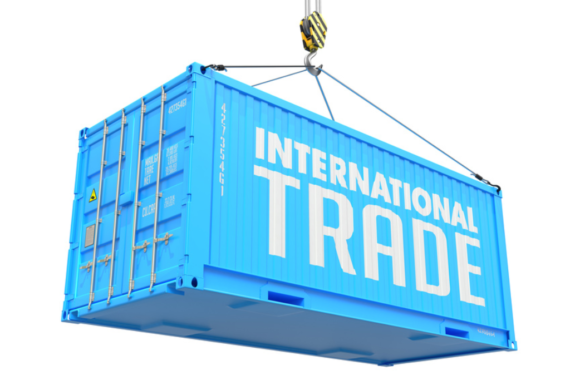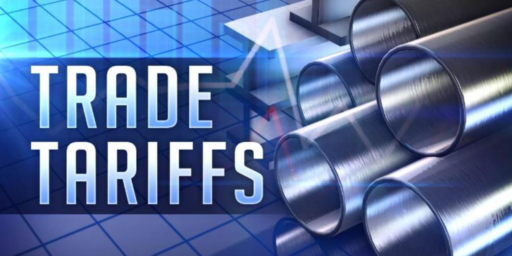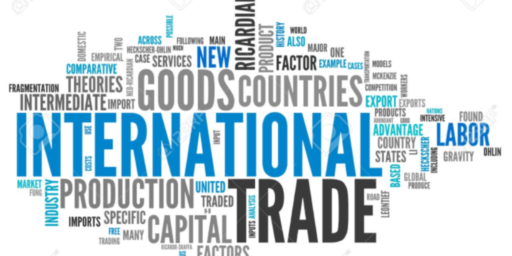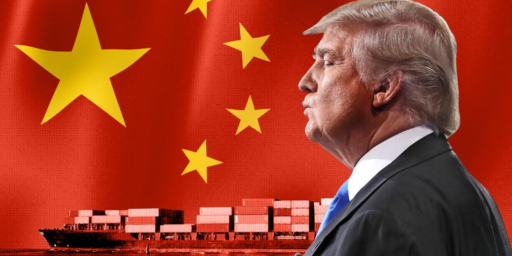The True Cost of Trade Wars
The cost of Trump's trade policies are well beyond the cost of soy beans.

As stupid as it is to create a situation in which the federal government has to subsidize farmers to the tune of billions as a direct result of Trump’s tariff policies. Or, as frustrating as it is to hear Trump talk like China pays tariffs directly to the US Treasury rather than admitting (or even understanding) that tariffs are taxes borne by American companies and consumers, these are not the real costs of trade wars.
The real problem with Trump’s approach to the global economy, and one that has concerned me since the campaign, is that he clearly does not understand the nature of the post-WWII economic order that was carefully constructed to help maintain system-level peace. And more than the post-WII order, let’s note that a globalized, liberal economic regime has been the dominant one since the end of the Cold War.
Now, is this order perfect? No. To paraphrase a quip I saw on Twitter (I can’t remember who said it): the current liberal international order may not actually be all that liberal, but it is one hell of lot more liberal than the previous international order.
To follow from that thought: global free trade isn’t really “free” but it is a lot freer than previous systems.
Put yet another way: economic nationalism not only leads to less free trade, and harms consumers in the process, it also often leads to military conflict.
And yes, I understand that globalization can harm citizens due to job losses and other factors. I think that national governments need to be better about taking care of their citizens. But I also know that the economy is global whether one likes it or not.
This all leads to a recent Paul Krugman column: Killing the Pax Americana and its apt subtitle, “Trump’s trade war is about more than economics.”
Trump’s critics, while vastly more accurate than he is, also, I think, get a few things wrong, or at least overstate some risks while understating others. On one side, the short-run costs of trade war tend to be overstated. On the other, the long-term consequences of what’s happening are bigger than most people seem to realize.
[…]
For trade policy isn’t just about economics. It’s also about democracy and peace.
The ellipses contains a lot of discussion about the short term consequences of a trade war. But the longer term is really key. (And, I would note, trade policy is Krugman’s specific area of expertise).
This is obvious and explicit in Europe, where the origins of the European Union lie in the Coal and Steel Community of the early 1950s — an agreement whose economic benefits, while real, were in a way incidental to its real purpose, preventing any future wars between France and Germany. And membership of the E.U. has always been contingent on democratization — which is, by the way, why the E.U.’s limp reaction to the de facto collapse of democracy in Hungary and, it appears, Poland represents such moral failure.
It’s more implicit in the case of the United States. But the historical record is pretty clear: the postwar trading system grew out of the vision of Cordell Hull, FDR’s Secretary of State, who saw commercial links between nations as a way to promote peace. That system, with its multilateral agreements and rules to limit unilateral action, was from the beginning a crucial piece of the Pax Americana. It was as integral to the postwar order as the I.M.F., which was supposed to provide a safety net for nations having balance of payments trouble, or for that matter NATO.
And Trump’s trade war should correspondingly be seen as part and parcel of his embrace of foreign dictators, lack of respect for our allies, and evident contempt for democracy, at home as well as abroad.
All of this reminds me of a recent visit to my campus of the Counsel-General of Japan from the Atlanta Consulate. He noted in his presentation to students that his government was profoundly disappointed that the US government was considering Japanese steel to be a national security threat and that he hoped that the matter could be settled soon. And he took an otherwise diplomatic approach to Trump (indeed, he played up how well Trump got along with PM Abe).
Krugman continues:
But wait, you say: China is neither an ally nor a democracy, and it is in many ways a bad actor in world trade. Isn’t there a reasonable case for confronting China over its economic practices?
Yes, there is — or there would be if the tariffs on Chinese products were an isolated story, or better yet if Trump were assembling an alliance of nations to confront objectionable Chinese policies. But in fact Trump has been waging trade war against almost everyone, although at lower intensity. When you’re imposing tariffs on imports of Canadian steel, on the ludicrous pretense that they endanger national security, and are threatening to do the same to German autos, you’re not building a strategic coalition to deal with a misbehaving China.
I would add that is why withdrawing from the TPP was a mistake (and it was mistake for HRC to promise to do so as well). Further, while China is not an ally, the reality is that our interconnected economies make actual military confrontation highly unlikely.
Trump talks like what he is doing is making America stronger, but it is a fool’s version of strength. Fighting a unilateral trade war with China (while not understanding that China can find other trading partners in the global economy) is patently stupid (as is fighting, or threatening to fight, with long-term allies). Indeed, in fighting with China and creating tension within NAFTA Trump is fighting with three of our largest trading partners. And to what end? Subsidizing soy bean farmers?
Worse, the net effect of these policies, if taken to their logical conclusion is not the strengthening of America, it is the weakening of it.
But where the Europeans are weak, Trump is malign. He’s working actively to make the world a more dangerous, less democratic place, with trade war just one manifestation of that drive. And the eventual negative consequences for America and the world will be much bigger than anything we can capture with economic modeling of the effects of tariffs.
So, yes, I understand that neoliberalism is not utopia and that there are winners and losers to every structure. However, Trump is leading the world down a pathway that we know is more prone to conflict and breakdown. History is quite clear on this. This is all the opposite of making American great.





Betcha a dollar China has thrown the door open wide for Kim Jong Un. It’s an obvious move.
If I were Xi I’d also be looking to help Iran. China makes some capable missile systems, including the DF-26, a so-called ‘carrier killer’ as well as SAMs and presumably some good anti-ship mines. A US-Iran war would be brilliant for China, a huge distraction that would drive a thick wedge between us and our much-abused allies.
They may end up caving to Trump on trade, but the Chinese have long memories. They will ensure it never happens again. Going forward they won’t just see us as a trade competitor, or even as the superpower bully that dominates their nearby waters, but as a mortal enemy. This trade war could be the Asian equivalent of the US/Allied expeditionary forces sent against the Bolsheviks during the Russian revolution.
But it isn’t just about China, as you rightly point out. A US with a degraded military leadership openly hostile to NATO is an invitation to Putin to start squeezing the Baltic countries. Klaipeda is Lithuania’s only significant port and from Kaliningrad the Russians could shut it down inside of ten minutes. And given that Klaipeda has a large ethno/linguistic Russian population, it would be child’s play for the GRU to manufacture a Donbas pretext.
Does anyone know the game plan here? Do we end up buying less Chinese stuff, and will that result in buying more from some third party, making it ourselves, or going without? Are the Chinese supposed to buy more stuff from us, or will they find third parties like Brazilian soybean growers? I am thinking that if they could get something by making/growing it themselves they’d already be doing so. Since the Chinese leaders don’t face elections, their ability to fight a trade war that causes their citizens pain is greater than ours.
Military action is out of the question. China is a nuclear power. The wars in Korea, Vietnam, and Iraq over the last seventy years do not indicate that the US is exactly undefeatable.
@michael reynolds:
Maybe not as much as we might think on this side of the world. Of course, part of the equation is what you mean when you say “thrown the door wide open for Kim Jong Un.” Xi has not succeeded in turning all of China into Shanghai and has many areas that could use the economic drain NK represents as well as NK does. China has a similar “foreign aid” problem to ours–the money is small overall, but looks yuuuuuge to the homefront areas that aren’t getting it (and probably need it just as desperately, maybe contrary to our situation in the US). Additionally, China’s “control” over what Kim does has been greatly exaggerated. Xi would probably be just as well served overall by encouraging Kim to seek a more conciliatory posture to global trade and abandon Juche, but the perceived political cost (and risk) of losing the buffer to encroachment that NK represents may be too high for the leadership as a whole to embrace. It’s a knotty problem. In any event, I’ll cover your dollar on that one.
Whatever the outcome of Tiny’s trade war, two things are a lock to happen.
A lot of farmers will be out of business.
And any benefit will accrue to the 1%.
@Just nutha ignint cracker:
He does not need to. A middle income China can be the largest economy of the world in GDP.
The main problem is that Trump is simply reflecting a type of vision that many Americans have, where the United States is the only country in the world. A lot of Americans in the Left that complains about outsourcing forget that outsourcing only became a thing because Asian companies had a supply chain that proved to be extremely efficient in the 70’s and 80’s.
When people like Ben Shapiro talks about “Judeo-Christian Civilization” or some idiocy like that they are reflecting this vision of the world.
I think that part of the problem is that tariffs are an end, not means to achieve some end.
He has an idea where the United States manufactures smartphones and televisions and where is the only industrialized economy in the world.
Some years back (10-15?) a friend mentioned the possibility of armed conflict between the US and China. I scoffed at the suggestion pointing out that it would be economic suicide for both countries. Every single trump trade move that lessens our economic ties with other countries also lessens the need to avoid conflict. Instead of investing so much money in the US economy, maybe the Chinese will just double their investments in Africa and S America. Lord knows, the potential payoff is much higher.
@Sleeping Dog:
“Whatever the outcome of Tiny’s trade war, two things are a lock to happen.
A lot of farmers will be out of business.
And any benefit will accrue to the 1%.”
And according to one retired farmer, farmers who speak up against the trade war are being threatened with loss of ability to rent land and obtain financing:
“Why aren’t we hearing more concern? Because the current administration has made it impossible for farmers to criticize without retaliation from Republican landowners.
A farmer who wrote an opinion piece early last year in response to farmers’ incomes dropping more than 50% since 2013 and highlighted the increase in farmer suicides due to status-quo policies, lost 300 acres of sharecropped land because word got out that he was a Democrat.
Money lenders in agriculture base who they lend money to on more than just financial statements. Lenders make phone calls within the community to understand the “general character” of someone. The idea is to see if the farmer in question is in good standing in the community and doesn’t have anything to “hide.” But rumors spread all the time about certain operations having to file for bankruptcy.”
@Andre Kenji de Sousa:
Exactly. I think “MAGA” is about a flawed, simplistic vision of what Trump thinks the 1950s were like. Steel. Coal. GM. America the most powerful country (without understanding that Asia and Europe were still rebuilding from WWII and much of the developing world had not yet industrialized).
It is a vision based on ignorance and a childlike understanding of the 1950s.
@Just nutha ignint cracker:
It wouldn’t cost China much to greatly improve NK’s weapons stock. Anti-ship missiles, air defense systems, some satellite intel, maybe some decommissioned subs. In the weird math of asymmetric warfare if we blew up their nuke facilities and they shot down a single B-52 or a couple of F-18s, especially if they took some personnel alive, they’d look like champions and we’d be the ones holding hearings into the failure.